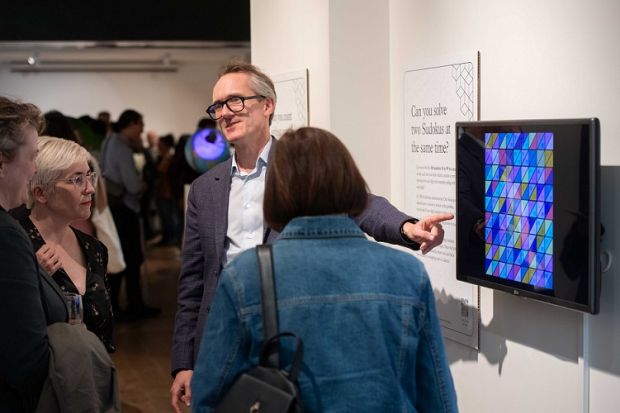My interest in mathematical history started in late 2022, when the UK’s Quality Assurance Association (QAA) launched a consultation on a subject benchmark statement calling on all universities to present a “decolonised view” of mathematics.
Decolonisation is a contested term. One interpretation of decolonisation in science asserts that non-white scientists have been neglected and seeks to correct for this. As a June 2022 guest editorial in Nature put it: “For too long, science’s textbooks, along with the author and reference lists in research papers, have neglected to include Black, Indigenous and other historically marginalised peoples.” Hence it is “important for science curricula, research and academic spaces to go through decolonisation processes”, and these are “not political or ideological acts, but part of science itself – an example of science’s self-correcting mechanism in the pursuit of truth”.
To ensure that I had an accurate picture of how decolonisation is generally conceived, I conducted a literature review of the available English-language research literature on decolonising mathematics. The common theme I found was a questioning of the privileging of mathematical knowledge over other beliefs, such as spiritual ones. Eight of the 37 papers cited the late Peruvian sociologist Aníbal Quijano, who is generally credited with introducing the academic concept of decoloniality. Quijano argues that the idea of rational knowledge is “European” and has been used to impose imperialism and capitalism. Another 12 articles cited a paper by the late mathematics educationalist Alan J. Bishop called “Western mathematics: the secret weapon of cultural imperialism”, which argues that “rationality”, abstraction, “power and control” and “progress” distinguish Western mathematical thinking from Indigenous mathematics.
Campus resource: Decolonising learning through access to primary sources
In an open letter opposing the QAA’s proposal – which I organised and which was signed by, among others, seven fellows of the Royal Society – we pointed out the importance of postmodern thinking to the programme of decolonisation. This claim is borne out by the literature review and by another Nature editorial, from 2023, which states that debates about decolonisation of mathematics “reprise aspects of an older, more academically focused debate on whether – or to what extent – scientific knowledge is socially constructed”.
The concern we raised was that it is wrong to represent mathematics as primarily Western and that doing so risks politicising mathematics courses.
In fact, an exhibition that I have co-organised with other academics and students at King’s College London seeks to illustrate that there is nothing European about rationality. The exhibition, which opened this week, does not directly mention decolonisation. However, it highlights the fact that our number system originates in India, that algebra has its origins in Persia and that, sometimes, the same mathematical ideas have emerged independently in different places.
For instance, the concept of zero was developed both in India and by the Maya in Central America. And the Keralan mathematician Madhava and the German mathematician Gottfried Leibniz seem to have independently discovered the same remarkable formula for pi (Madhava first, by some centuries). Such examples challenge the postmodern idea that mathematical truth is socially constructed.
My co-organisers and I are a diverse group, and while I might read a certain message into the history of mathematics that our exhibition presents, they may read it differently. I hope we do not impose a single reading on our visitors.
This is important because my central concern with the QAA’s proposals, and similar edicts from other NGOs and university managers, is that they seek to impose a certain political perspective across all universities and all subject areas. The benchmark statements require that all subjects include “education for sustainable development”, which the QAA explicitly links to critical pedagogy, an approach to teaching based in critical theory that seeks to centre education around social justice.
If we are to include political elements across our curricula, it is vital to do so in a way that encourages debate. This can be difficult; opposition to decolonising mathematics has been presented as bad faith argument, media misrepresentation and ignorance. But proponents and opponents of decolonisation agree on a great deal, and I’ve seen a growing willingness to debate its merits. The UK’s Academy for Mathematical Sciences, for instance, has acknowledged the importance of debate and has consulted widely in the development of its own policies.
Alongside our exhibition, we will hold a workshop on race and mathematics, which will consider decolonisation but also other approaches to improving minority experiences, and our scientific committee includes Durham University statistician Emmanuel Ogundimu, who has worked on decolonisation.
We aim to promote a constructive dialogue on how to make mathematics as inclusive as possible. Even if we have to agree to disagree, at least we will have made our best efforts to understand each other and find common ground. And whatever conclusions they draw, I hope visitors to our exhibition will learn some thought-provoking mathematics.
John Armstrong is reader in financial mathematics at King’s College London. The free exhibition, It All Adds Up: Global Discoveries in Maths, is at the Discovery Space, Bush House until 26 June. It has received funding and support from King’s.
Register to continue
Why register?
- Registration is free and only takes a moment
- Once registered, you can read 3 articles a month
- Sign up for our newsletter
Subscribe
Or subscribe for unlimited access to:
- Unlimited access to news, views, insights & reviews
- Digital editions
- Digital access to THE’s university and college rankings analysis
Already registered or a current subscriber?










